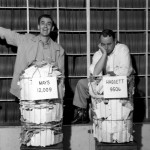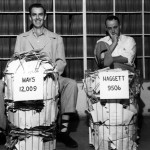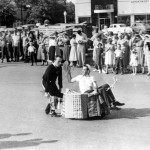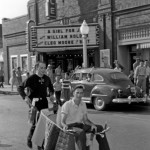The photos below are from an on-air promotion where listeners voted (with postcards) for their favorite type of music. “Pop” (John Mays) vs. “Country” (Jimmy Haggett). The loser had to push the winner, in a wheelbarrow, for the full route of the annual Fall Festival Parade. Wearing a skunk suit. The promotion was a reprise of contest a few years earlier, between Ray Van and Tommy “Butterball” Paige.
Interview with Jimmy Haggett for the 35th anniversary of KBOA (1982)
The following biographical information was written by Colin Escott and is provided courtesy of John Klompenhouwer (originally published at 706 Union Avenue Sessions) and is used here with his permission. There’s also a Wikipedia page.
James Clecy ”Jimmy” Haggett had always been a shadowy figure from the dawn of Sun’s golden era. From the scant evidence available, it appeared as though Haggett worked on the periphery of the Memphis scene, dropping out of sight as the rockabilly revolution swept everything before it. However, it transpired that Haggett had coped with the new music better than anyone had previously thought.
Born December 2, 1928 in Granite City, Illinois, and moved back to his dad’s home state, Missouri, when he was small. Later he moved to Patterson, then he sit by the battery operation radio and listen to the Grand Ole Opry. On occasion, the neighbors would come to his little farm house and there gather around and listen to the show.
Jimmy, his brother and another school friend organized themselves into a group and secured a regular 30 minute slot on KWOC in Poplar Bluff, Missouri. They also played fairs and rodeos and became well known locally before moving to KREI, Farmington, Missouri. The group played 30 minutes every Saturday and eventually secured a similar gig at KFMO, Flat River, Missouri.
Jimmy Haggett split from the group after three months at KFMO and moved back to KREI as a disc jockey. The station had promised him a chance as a disc jockey if he could find a sponsor for his show. He found a sponsor and worked a two hour show every day and started playing nightclubs with a reorganized group.
In 1953 Jimmy wrote to KBOA, Kennett, Missouri, enquiring whether they had a slot for a country musician and disc jockey. The station invited him for an interview and he started work 2-4 hours a day, still working the nightclubs virtually every night. In early 1955 Haggett booked Bud Deckelman into Kennett. Deckelman was riding the crest of a short lived wave that began and ended with “daydreamin'” but, when he returned to Memphis, Deckelman called Sam Phillips and suggested that he contact Haggett with a view to making a record. On August 23, 1955, Jimmy Haggett and his group, who were known as the Ozark Mountain Boys at this time, made the journey to Memphis and recorded four songs for Sam Phillips.
1955 was a banner year for Jimmy Haggett. It not only marked his debut on record but it also brought acclaim at the Annual Disc Jockeys Convention on November in Nashville. The same convention that saw Elvis Presley perform to the amazement of Steve Sholes and Ann Fulcino from RCA Victor, also saw the election of Jimmy Haggett as Disc Jockey of the Year.
Haggett’s record, which coupled “No More” and “They Call Our Love A Sin”, was released after the negotiations with RCA over Presley’s future had been completed. it was almost too late. The face of country music changed a lot during those few months and Jimmy Haggett’s single was lost in the shuffle as Phillips desperately tried to accommodate all of the action that “Blue Suede Shoes” was getting. Haggett decided that times were changing and that he had better change with them.
After his second Sun session in 1956, Jimmy had moved from KBOA to KWYN, Wynn, Arkansas, where helped to start up the station. He then moved to the prestigious 5000 watt KLCN in Blytheville, Arkansas. Once again, he was voted disc jockey of the year and worked more professional shows during 1956 than at any other time in his career. Jimmy Haggett had also made the sensible move of bringing a rock and roll singer into his band under contract. The youngster was Buford Peak and Haggett arranged a recording session at Fernwood Records in Memphis that featured Peak. “I used him on a lot of rock and roll stuff on our personal appearances so I felt that I would like to have a record released by him to help our gigs.
Slim Wallace, the owner of Fernwood, and I agreed that Buford’s name would go on the label”. The record became the second release on Fernwood, although sales were disappointing. Peak later left Haggett’s band, joined another group and was killed in approximately 1965 on the way to a show in southern Illinois.
Jimmy Haggett’s greatest success came with a song he leased to Caprock Records in Big Springs, Texas. “Without You” was a gently country ballad that had shades of Jimmy’s favourite artist, Jim Reeves. It became a regional breakout in several markets but never reached the national charts. It is surprising that a major label did not offer to lease the titles because both the song and the performance were very strong.
After Jimmy Haggett left KLCN he moved back to KBOA for a year before relocating to Portageville, Missouri, as general manager of KMIS. The experience he gained there encourage him to apply for a FCC license to build his own station and, in May 1966, Jimmy Haggett and Galen Watson opened KPWB in Jimmy’s hometown of Piedmont, Missouri.
Jimmy Haggett sold his share of KPWB in 1975 and has been inactive in the music business for the last ten years. There are many artists on Sun Records who moved easily, and happily, from hillbilly music to rockabilly. Jimmy Haggett epitomises those who made some concessions to the newer sounds but never quite had their heart and soul in it. To this day, he regards the two religious narrations that he recorded at Sun in 1955 as his finest work and he was disappointed that we could not trace them. It says something for Jimmy’s versatility that he could move from “No More” to “Rabbit Action” in a few months, but, in the final analysis, it is a pity that he did not arrive at Sun a little sooner when Sam Phillips was seriously experimenting with country music, or a little later when Jack Clement was recording Ernie Chaffin. Perhaps the history books would have been written differently.
James Clecy Haggett died on January 30, 2000 in Piedmont, Missouri. James Haggett is buried in Rockwell Cemetery located in Patterson, Missouri. (CE)




